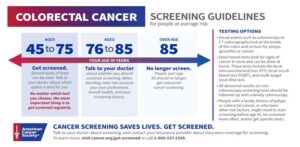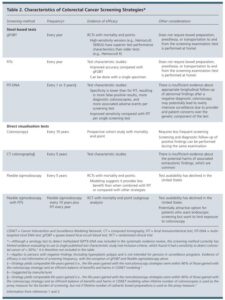Colorectal cancer guidelines for physicians: Facts and recommendations
Update from Aisha Akhtar, MD
Colorectal cancer is not only the third most commonly diagnosed cancer, but also the third leading cause of death in the U.S. among men and women. March is the third month of the year; that’s why it was chosen as Colorectal Cancer Awareness Month. Being a colorectal cancer surgeon, I would like to take the opportunity to provide new facts and updates on colorectal cancer screening.
According to Colorectal Cancer Statistics 2023 Report published by American Cancer Society, the percentage of individuals in the U.S. diagnosed with advanced-stage colorectal cancer increased from 52% in the mid-2000s to 60% in 2019. In addition, diagnoses of colorectal cancer in people under 55 years of age doubled from 11% (1 in 10) in 1995 to 20% (1 in 5) in 2019. This report is concerning to all clinicians as it highlights that colorectal cancer incidence is rapidly shifting towards the younger population and emphasizes the need to start screening early.[1]
American Cancer Society and the U.S. Preventive Services Task Force now recommend colorectal cancer screening at age 45 for average risk individuals. For high-risk individuals, the screening should start even earlier. A person is considered at high risk for colorectal cancer if a first degree relative had colorectal cancer or high-grade polyp before the age of 60, family history of hereditary syndromes, personal history of ulcerative colitis or Crohn’s disease, or previous history of cancer treated by radiation to the abdomen or pelvis. For such individuals, the screening should start at age 40 or 10 years earlier than age of cancer diagnosis in the relative.[2] The guidelines are further elaborated in figure 1.

A colonoscopy is considered the gold standard for colorectal cancer screening. However, there are other options available. The U.S. Preventive Services Task Force considers the following methods to be acceptable screening tests for colorectal cancer: Stool based tests, flexible sigmoidoscopy, double contrast barium enema, virtual colonoscopy and colonoscopy. The ability to detect cancer and screening interval varies among these tests. Due to ease of collection and avoidance of bowel preparation, many providers and patients prefer stool-based tests. These tests are appropriate only in average risk patients without any concerning symptoms.[4] The U.S. Preventive Services Task Force has recommended these guidelines about these tests as given in table 1.

Early screening is a key to prevent colorectal cancer deaths. The most significant change in the latest recommendations is to start screening at age of 45 to include the younger population who is being diagnosed with colorectal cancer more frequently. [1,3]
About 90% of colorectal cancer deaths are thought to be preventable. Most colorectal cancers develop from benign polyps (adenomas and serrated polyps) through a series of genetic and epigenetic changes over 10 to 15 years. Early detection and removal of precancerous colorectal polyps during a colonoscopy stops their progression to colorectal cancer. Colorectal cancer is highly curable cancer if detected early.[5]
It is very important for physicians to understand the importance of colorectal cancer screenings and ensure their patients are following screening guidelines.
References:
- Siegel, RL, Wagle, NS, Cercek, A, Smith, RA, Jemal, A. Colorectal cancer statistics, 2023. CA Cancer J Clin. 2023; 1- 22. doi:10.3322/caac.21772
- Colorectal Cancer Screening for Average-Risk Adults: 2018 Guideline Update from the American Cancer Society. Published May 30, 2018 in CA: A Cancer Journal for Clinicians. First author Andrew M.D. Wolf, MD. University of Virginia School of Medicine, Charlottesville, Va.
- Chen FW, Sundaram V, Chew TA, Ladabaum U. Advanced-stage colorectal cancer in persons younger than 50 years not associated with longer duration of symptoms or time to diagnosis. Clin Gastroenterol Hepatol. 2017;15(5):728-737.e3. doi:10.1016/j.cgh.2016.10.038
- Issa, Iyad A, and Malak Noureddine. “Colorectal cancer screening: An updated review of the available options.” World journal of gastroenterology vol. 23,28 (2017): 5086-5096. doi:10.3748/wjg.v23.i28.5086
- Rex DK, Boland CR, Dominitz JA, et al. Colorectal cancer screening: Recommendations for physicians and patients from the U.S. Multi-Society Task Force on colorectal cancer. American Journal of Gastroenterology 2017; 112(7):1016–1030.
